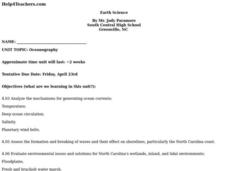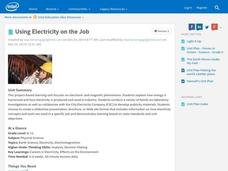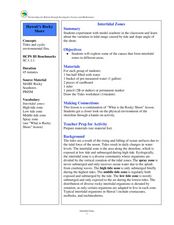Curated OER
Catch a Wave
Young scholars study low tides and how to calculate for fresh water. In this ocean science activity, students pretend they are stranded on an island and must calculate low tide in order to source the fresh water aquifer. Young scholars...
Curated OER
Wonderful Waves - Ocean Waves and Erosion
Students examine how waves are generated by wind, create a model that uses wind to create waves and conduct an experiment that demonstrates the effect that waves have on the coastline.
Curated OER
Wave Erosion Lesson
Fourth graders examine the effects of waves as they erode coastal land. They discover how the power of water can change the appearance of land formations.
Curated OER
Earth Science
Students analyze the mechanisms for generating ocean currents, temperature, and deep ocean circulation. They are able to assess the formation and breaking of waves and their effect on shorelines, particularly the North Carolina coast. ...
Curated OER
Oceanic Heat Budget Activities
Young scholars map and research imaginary islands located in different parts of the world. They describe the weather and climate of their island and show how local currents, water temperatures and waves may influence the weather patterns.
Curated OER
The Magic School Bus Goes to Mussel Beach
Young scholars investigate tides and create a model of an intertidal zone. In this hands-on marine science lesson based on a Magic School Bus book, the teacher leads students in a discussion about tides, then helps young scholars model...
Curated OER
Conditions at Sea Data Activity
Students study how to forecast sea conditions. In this oceanography lesson students complete a class activity on wave making.
Curated OER
Biomes: The Threat of the Sea
Middle schoolers create posters to raise awareness about Global Warming as an immediate threat. In this environmental instructional activity, students respond to the video Biomes: The Threat of the Sea by researching global warming...
Curated OER
Aquatic Ecosystems
Ninth graders record information on aquatic ecosystems and create a labeled diagram of an ecosystem of their choice. They can choose from an ocean zone, estuary, river, lakes, or beaches. The student has to explain their biome of choice.
Curated OER
Regolith Formation
Students explain the difference between regolith formation on Earth and the Moon. In this space science lesson, students model the different factors affecting regolith formation on Earth. They identify the different types of weathering.
Intel
Using Electricity on the Job
Learners explore electricity, discussing its importance and researching different ways in which electricity can be generated. Groups present their findings to the class and then create publicity materials which promote and educate about...
Curated OER
Earthquake Experiments
Students discuss the effects of earthquakes. In this earth science activity, students create earthquake models and earthquake-proof buildings. They construct their own seismograph.
Curated OER
Intertidal Zones
Students explore intertidal zones. In this intertidal zones lesson plan, students work in small groups and use ready-made materials to create a model of intertidal zones. Resources are provided.
Curated OER
Earthquake Proof Structures
Eighth graders build a structure that is able to withstand a simulated earthquake. They research earthquakes, earthquake measurement, and society's preparation for and reaction to them. Pupils build models and present them to the...
Curated OER
Social Studies: Exploring Japan
Fourth graders examine the culture and environment of Japan, beginning with a KWL chart. They use clay and cups of water to construct representations of the Japanese Islands. After designing flags representing farming and food, 4th...
Curated OER
Water Quality Monitoring
Students comprehend the four parameters of water quality. They perform tests for salinity, dissolved oxygen, pH and clarity or turbidity. Students comprehend why scientists and environmental managers monitor water uality and aquatic...
Curated OER
The Magic School Bus Goes to Mussel Beach
Students participate in a hands-on activity where they explore tidal zones. They explore tides and marine life. This is an experiment that can be accomplished in class.
















